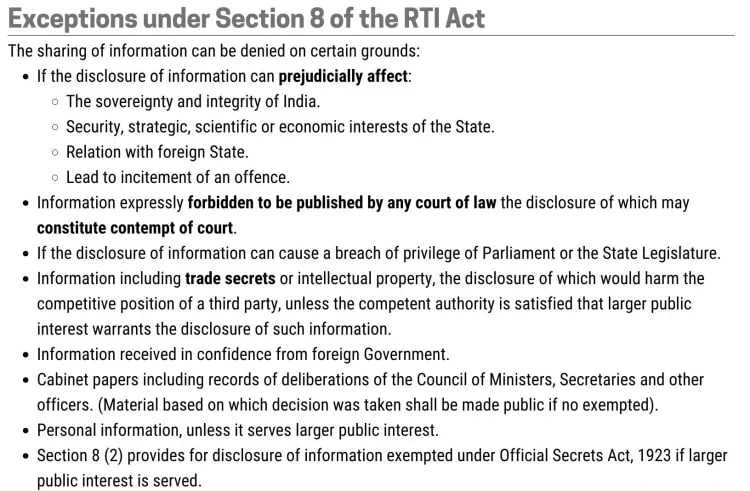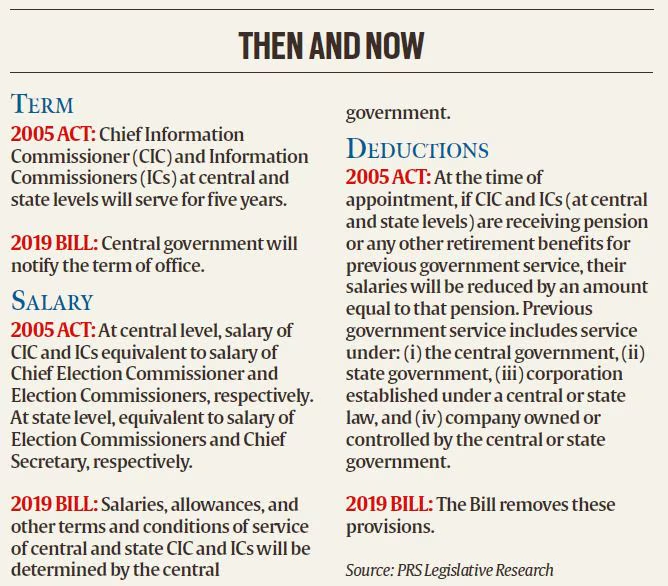



Copyright infringement not intended
Picture Courtesy: THE HINDU
The RTI Act empowers citizens by treating the government as a custodian of information that belongs to the people, but its Section 8(1)(j) seeks to balance this transparency with the right to personal privacy.
The Right to Information (RTI) Act was passed in 2005, empowers citizens to access information held by public authorities.
It replaced the Freedom of Information Act, 2002, and codifies the right to information as part of Article 19(1)(a) (freedom of speech) of the Constitution.
The Act mandates public authorities to respond to citizen requests within 30 days (48 hours for life-and-liberty matters) and proactively disclose key information.
|
Read all about: Right to Information Act (RTI) |
Right to Access: Any Indian citizen can request information from public authorities, including government departments, Public Sector Undertakings (PSU), and NGOs funded by the government.
Exemptions: Section 8 lists exemptions, e.g., national security, commercial secrets, and personal information (Section 8(1)(j)). Disclosure is allowed if public interest outweighs harm (Section 8(2)).
 Process: Public Information Officers (PIOs) handle requests; appeals go to First Appellate Authorities and Information Commissions.
Process: Public Information Officers (PIOs) handle requests; appeals go to First Appellate Authorities and Information Commissions.
Proactive Disclosure: Section 4 requires public authorities to publish key details (e.g., budgets, policies) online or offline.
Penalties: PIOs face fines (up to ₹25,000) for wrongful denial or delays.
Empower Citizens: Gives people tools to question government actions and policies.
Promote Transparency: Ensures public authorities share information openly.
Enhance Accountability: Forces officials to justify decisions, reducing arbitrariness.
Combat Corruption: Exposes misuse of power or funds, strengthening democracy.
Strengthen Democracy: Encourages informed citizens to participate in governance.
The RTI Act transforms governance by making it transparent, accountable, and citizen-driven.
It shifts power from bureaucrats to people, enabling scrutiny of government actions, uncovering issues like fund misuse or policy flaws.
It aligns with the democratic principle that the government is a custodian of public information, not its owner.
By promoting accountability, it reduces corruption and strengthens trust in institutions.
Without RTI, democracy risks becoming opaque, with citizens disconnected from decision-making.
2005 Original Act: Section 8(1)(j) allowed withholding personal information unless it served public interest or was shareable with Parliament/State Legislatures. This balanced privacy and transparency.
2019 Amendment: Changed terms of Information Commissioners (salaries, tenures set by the Centre), criticized for reducing independence.
2023 DPDP Act Amendment: Section 44(3) of the Digital Personal Data Protection (DPDP) Act altered Section 8(1)(j) to exempt all personal information, removing public interest and parliamentary disclosure clauses. This risks blanket denials.
CPIO vs Subhash Chandra Agarwal (2019): Supreme Court emphasized balancing transparency (Article 19) and privacy (Article 21).
Vishwas Bhambhurkar Case (2017): Central Information Commission ruled that demanding Aadhaar for RTI applications violates privacy, reinforcing citizen rights.
Adarsh Housing Society Scam
RTI applications exposed that a building intended for war widows in Mumbai was illegally given to influential politicians and bureaucrats. The revelation led to the resignation of the then Chief Minister of Maharashtra.
Commonwealth Games funds diversion
A non-profit organization used an RTI query to expose that the Delhi government diverted ₹744 crore from funds meant for the Dalit community to the Commonwealth Games.
Ration card delivery
After being repeatedly asked for a bribe to issue a new ration card, a villager in Maharashtra filed an RTI application and received the card within three weeks, delivered by the local sarpanch.
MNREGA job cards
In Odisha, villagers filed an RTI application to investigate the delay in issuing job cards under the National Rural Employment Guarantee Act (NREGA).
Ration system reform in Delhi
Following complaints of ration shop irregularities, an NGO used RTI to access records, which exposed the large-scale diversion of grain.
Right to inspect exam answer sheets
In the case CBSE vs Aditya Bandopadhyay (2011), the Supreme Court ruled that students have the right to access their evaluated answer sheets under the RTI Act.
DPDP Act Conflict: The 2023 amendment allows authorities to deny information labeled as "personal," even if it serves public interest. This conflicts with the Act’s original balance.
Lack of independence: The 2019 RTI Amendment Act compromised the autonomy of Information Commissions by giving the government control over commissioners' terms and salaries.
Backlogs: Over 4 lakh appeals/complaints pend across Information Commissions (as of 2024). States like Jharkhand lack functional commissions.
Poor record-keeping: Many departments maintain poor records, which they use as an excuse to claim information is missing or cannot be retrieved.
Bureaucratic Resistance: PIOs often misuse exemptions (e.g., national security) to deny requests. Only 5% of eligible penalty cases see fines imposed. (Source: Deccanherald)
Attacks on activists: RTI activists who expose corruption face oppression, harassment, and violence, creating an environment of fear.
Understaffing: In September 20205, the Commission has only two Information Commissioners—against eight vacancies. (Source: The tribune india)
Exclusion of key bodies: Political parties remain outside the RTI's purview, limiting scrutiny of their funding and operations.
Repeal DPDP Amendment: Remove Section 44(3) to restore public interest and parliamentary disclosure clauses in Section 8(1)(j).
Restore autonomy: Reverse the 2019 amendments to ensure the independent functioning of Information Commissions, free from political influence.
Strengthen Commissions: Fill vacancies, ensure gender diversity, and grant financial autonomy. Impose penalties on non-compliant officials to deter bureaucratic resistance and ensure accountability.
Enforce strictly: Strengthen and strictly enforce the proactive publication of information by all public authorities to minimize the need for individual RTI requests.
Protect Activists: Enforce the Whistleblowers Protection Act, 2014, with clear rules to safeguard RTI users. Establish fast-track courts and dedicated helplines to address threats and harassment.
Digitize Records: Fully implement Section 4 for proactive disclosure, reducing RTI requests and PIO workload.
Train PIOs: Conduct mandatory RTI training to reduce misuse of exemptions and improve response rates.
Link compliance to performance: Incentivize transparency by tying RTI compliance to the performance evaluations of government departments and officials.
The RTI Act remains a vital tool for deepening democracy, but its true potential will be realized only through stronger enforcement, institutional reforms, and uncompromising protection of citizens’ right to know.
Source: THE HINDU
|
PRACTICE QUESTION Q. Balancing the right to privacy with the right to information is the biggest challenge to the Right to Information (RTI) Act. Critically analyze. 250 words |
Yes, the Supreme Court has interpreted the Right to Information as a fundamental right flowing from Article 19(1)(a) (freedom of speech and expression) and Article 21 (right to life and personal liberty) of the Constitution.
Despite a Central Information Commission (CIC) ruling in 2013 that they are public authorities, political parties have resisted being brought under the RTI Act.
The PIO must respond within 30 days of receiving the application. If the matter concerns the life or liberty of a person, the response must be provided within 48 hours.
© 2026 iasgyan. All right reserved